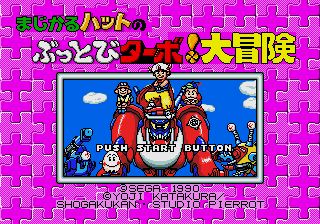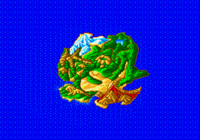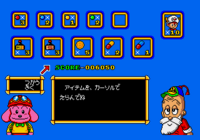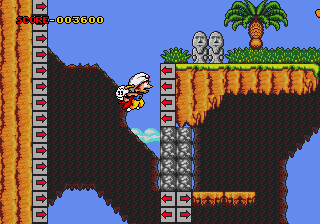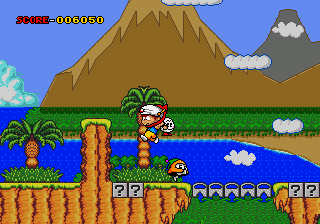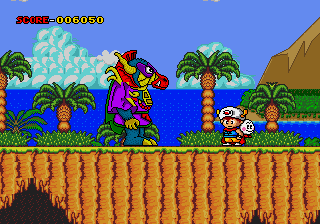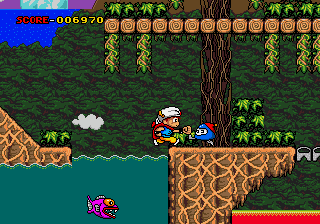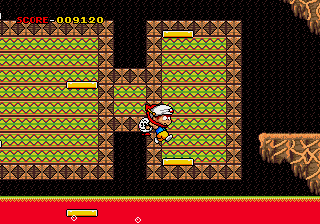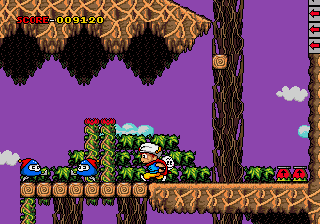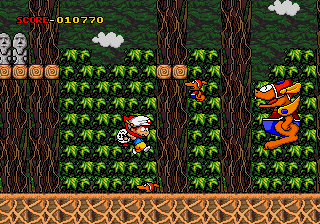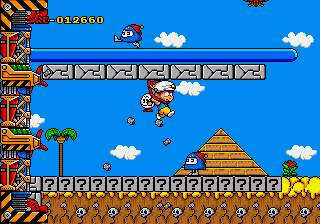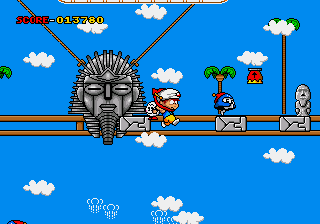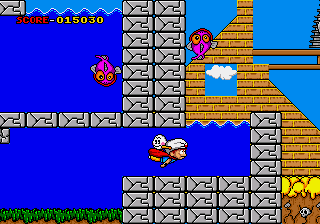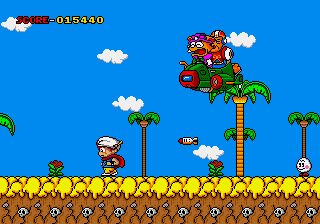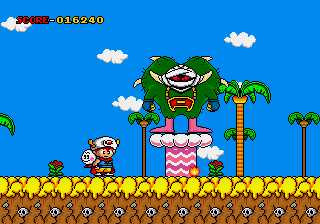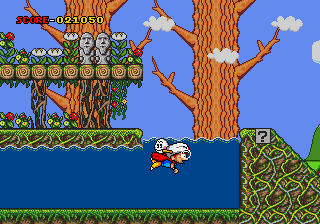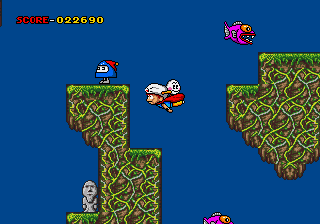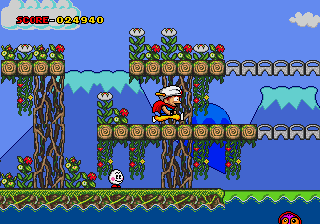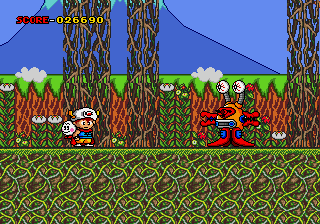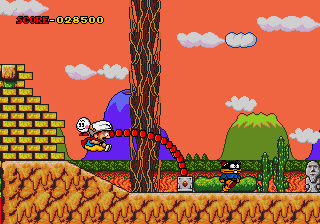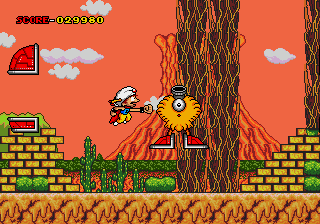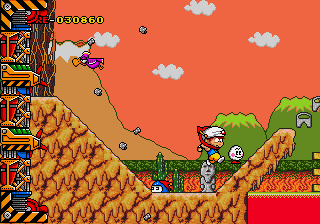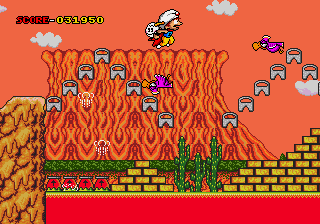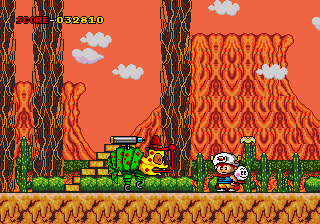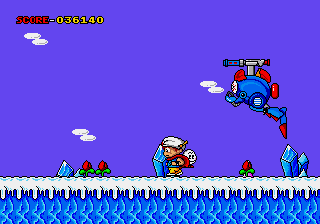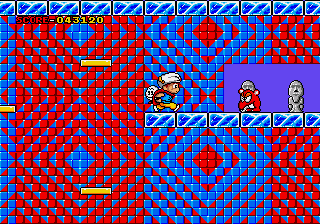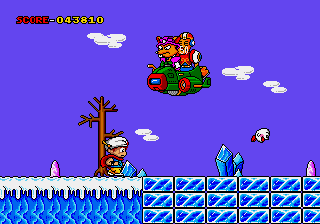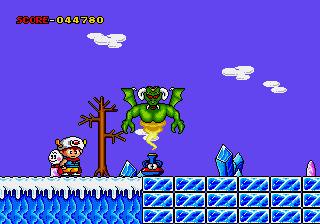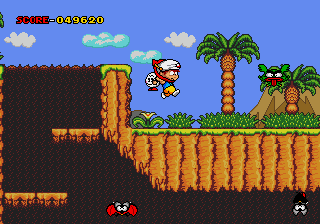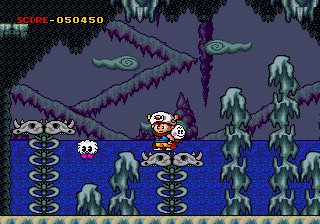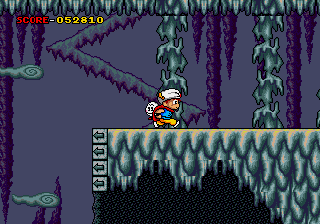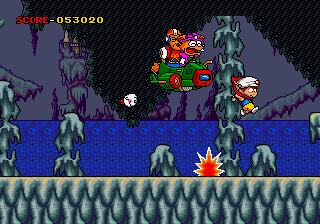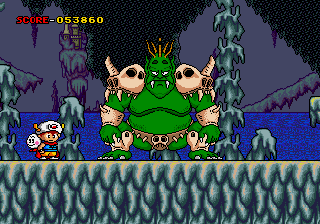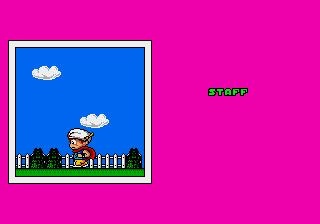Magical Hat no Buttobi Turbo! Daibouken
From Sega Retro
| Magical Hat no Buttobi Turbo! Daibouken | ||||||||||
|---|---|---|---|---|---|---|---|---|---|---|
| System(s): Sega Mega Drive | ||||||||||
| Publisher: Sega Enterprises, Ltd. | ||||||||||
| Developer: VIC Tokai | ||||||||||
| Licensor: Yoji Katakura, Shogakukan, Studio Pierrot | ||||||||||
| Sound driver: SMPS Z80 | ||||||||||
| Genre: Action[1][2] | ||||||||||
| Number of players: 1 | ||||||||||
|
Magical Hat no Buttobi Turbo! Daibouken (まじかるハットのぶっとびターボ!大冒険) is a 1990 game for the Sega Mega Drive developed by VIC Tokai and published by Sega to tie into Studio Pierrot's Magical Hat anime series. While this game was never released outside Japan, its story, graphics, level layouts, and music were changed into those of Decap Attack.
Contents
Story
Hat-kun (ハットくん) is the descendant of a legendary hero who long ago sealed away the evil of the world. The Emperor of the Underworld, Jiark (ジアーク), is threatening to break the seal and lay waste to the world. He has split Uson Island (ウソン島), the large island that comprises the surface world, into pieces. Only Hat, who possesses a magical turban, can stop him and reassemble the world.
Gameplay
The game is a platformer in which the player controls Hat through various side-scrolling levels. Levels consist of three rounds, which contain many enemies and hazards that can harm or kill Hat as well as items to collect. Hat must find the exit to each round. In the last round of each level, Hat must find a special piece of treasure to restore the island and defeat a boss. Hat is moved with ![]() and
and ![]() and ducks with
and ducks with ![]() . He can skip across water if he is running. He jumps with
. He can skip across water if he is running. He jumps with ![]() . Hat can slow his descent by pressing
. Hat can slow his descent by pressing ![]()
![]()
![]()
![]()
![]() in mid-air. He attacks enemies by punching them with
in mid-air. He attacks enemies by punching them with ![]() . He can punch while jumping but not while crouching. He can also jump on most enemies to defeat them; enemies must be jumped on multiple times to defeat them and can recover if left alone. When underwater, he swims with
. He can punch while jumping but not while crouching. He can also jump on most enemies to defeat them; enemies must be jumped on multiple times to defeat them and can recover if left alone. When underwater, he swims with ![]()
![]()
![]()
![]()
![]() .
.
Hat loses a life if he touches an enemy. If he loses all of his lives, the game ends. There are no continues. However, extra lives are relatively plentiful to compensate for this.
Hat can find his companion Robogg (ロボッグ), who perches on his back and can be thrown at enemies with ![]() . Hat can collect it again by walking over it after it lands or wait for it to automatically return like a boomerang. If Hat is hit by an enemy while Robogg is perched on him, Hat loses Robogg but does not lose a life.
. Hat can collect it again by walking over it after it lands or wait for it to automatically return like a boomerang. If Hat is hit by an enemy while Robogg is perched on him, Hat loses Robogg but does not lose a life.
During the game, the player can also collect a variety of items that provide special abilities such as temporary invincibility or eliminating all enemies on screen. These potions are kept in an inventory rather than used immediately when collected. The player can access the item inventory with ![]() to use an item or read a short description about what it does.
to use an item or read a short description about what it does.
Items
Items are contained in statues, which Hat can punch to break open. Sometimes statues contain no item or an enemy. Potions are placed in the player's inventory rather than used immediately. The player can open the item menu with ![]() to check the item inventory or use an item.
to check the item inventory or use an item.
Levels
| 山岳島 (Mountain Island) | |
|---|---|
| ジャングル島 (Jungle Island) | |
| 砂島 (Sand Island) | |
| 湖島 (Lake Island) | |
| 熱島 (Hot Island) | |
| 凍島 (Frozen Island) | |
| ウソン島 (Uson Island) | |
| 魔界 (Underworld) | |
Bonus game
There are two bonus games, and the game alternates between the two at the end of each round.
The first is a lottery minigame similar to amidakuji. The player places multiple Hats on five pathways. The number of Hats corresponds to the number of Coins found in the round. Multiple Hats can be placed on the same pathway. Once they have all been placed, they walk up the path to the end, crossing whenever there is a juncture and possibly collecting items along the way. Near the end is a moving maze, which the player can stop with ![]() . Then the Hats continue to the end of the path, which contains item prizes or a hole that Hat falls into for no prize.
. Then the Hats continue to the end of the path, which contains item prizes or a hole that Hat falls into for no prize.
The second resembles a slot machine. The player can bet Coins on each turn, and the game continues until the player runs out of Coins. The player wins an item by matching three of the same item across all three slots. They can match horizontally or diagonally. The slots must be stopped in the order of the leftmost slot with ![]() , the rightmost slot with
, the rightmost slot with ![]() , and the middle slot with
, and the middle slot with ![]() .
.
Production credits
- Producer: Sugea the Monster
- Programmer: Doctor Suzuki, K. Iwa, Nabe-Chan
- Character Designer: Dark Side Toshi, Porten
- Map Designer: Paul Weller
- Sound Composer: Anzaki Waraco
- Director: Credit Company
Magazine articles
- Main article: Magical Hat no Buttobi Turbo! Daibouken/Magazine articles.
Promotional material
Physical scans
| Sega Retro Average | ||||||||||||||||||||||||||||||||||||||||||||||||||||||||||||||||
|---|---|---|---|---|---|---|---|---|---|---|---|---|---|---|---|---|---|---|---|---|---|---|---|---|---|---|---|---|---|---|---|---|---|---|---|---|---|---|---|---|---|---|---|---|---|---|---|---|---|---|---|---|---|---|---|---|---|---|---|---|---|---|---|---|
|
| 71 | |
|---|---|
| Based on 12 reviews | |
Technical information
References
- ↑ File:Magicalhat md jp cover.jpg
- ↑ 2.0 2.1 https://sega.jp/history/hard/megadrive/software.html (Wayback Machine: 2020-07-20 09:51)
- ↑ File:Magical Hat MD credits.pdf
- ↑ Beep! MegaDrive, "January 1991" (JP; 1990-12-08), page 34
- ↑ The Complete Guide to Sega, "" (UK; 1991-05-xx), page 106
- ↑ Computer & Video Games, "March 1991" (UK; 1991-02-16), page 62
- ↑ Famitsu, "" (JP; 1990-1x-xx), page 1
- ↑ Games-X, "4th-10th July 1991" (UK; 1991-07-04), page 39
- ↑ Hippon Super, "January 1991" (JP; 1990-12-04), page 42
- ↑ Joystick, "Février 1991" (FR; 1991-0x-xx), page 113
- ↑ Sega Mega Drive Advanced Gaming, "January 1993" (UK; 199x-xx-xx), page 93
- ↑ Mega Drive Fan, "March 1991" (JP; 1991-02-08), page 99
- ↑ Power Play, "3/91" (DE; 1991-02-15), page 141
- ↑ Sega Power, "October 1991" (UK; 1991-09-05), page 53
- ↑ Sega Saturn Magazine, "September 1995" (JP; 1995-08-08), page 87
| Magical Hat no Buttobi Turbo! Daibouken | |
|---|---|
|
Main page | Comparisons | Maps | Hidden content | Magazine articles | Reception | Region coding | Technical information | Bootlegs | |
